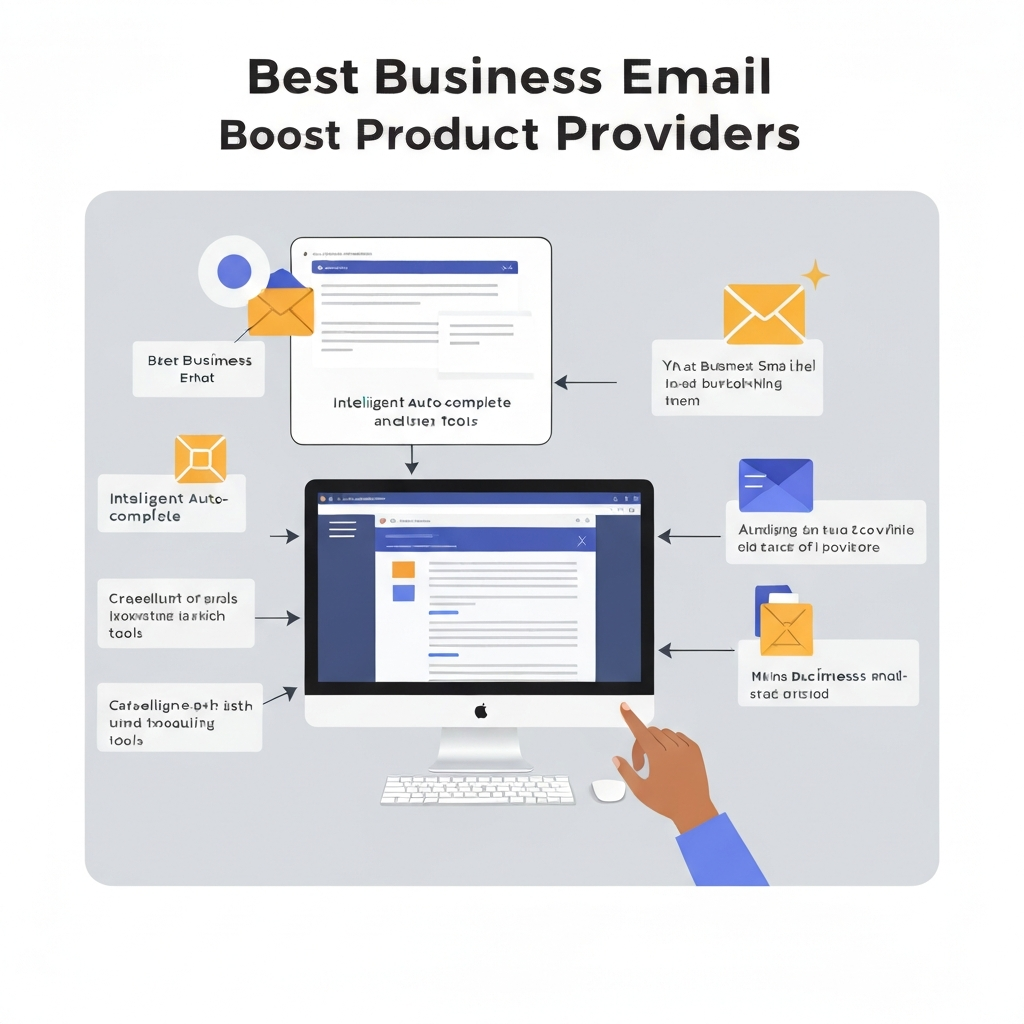Best Business Email Providers: Boost Productivity Now

In today's fast-paced digital landscape, email remains the cornerstone of professional communication. It's not just about sending messages; it's about fostering relationships, closing deals, managing projects, and building a brand. For businesses, the email service provider you choose is far more than a utility – it's a critical tool that can either streamline your operations or become a significant bottleneck. From ensuring your messages land in the inbox to safeguarding sensitive data, the right provider impacts productivity, security, and your professional image. This guide delves into the world of the best business email providers, helping you navigate the options to find a solution that truly boosts your team's efficiency and transforms your daily workflow. Choosing the right provider is more than just picking an inbox; it's about selecting the best business email providers that serve as the backbone of your daily operations. In fact, finding the best email provider can be a significant step towards enhanced efficiency, as discussed in our guide on top choices for productivity and comprehensive market reviews like those on EngageLab.
Key Features to Look for in a Business Email Provider
Selecting a business email provider requires a keen eye for features that go beyond basic sending and receiving. Here’s a breakdown of essential functionalities that differentiate a professional solution from a personal one:
- Security and Reliability: This is paramount. Look for robust spam and malware filtering, encryption (both in transit and at rest), two-factor authentication (2FA), and guaranteed uptime (e.g., 99.9% or higher). Data backup and disaster recovery capabilities are also crucial. A provider that offers secure business email is non-negotiable.
- Custom Domain Name: A professional email address (e.g.,
[email protected]) significantly enhances credibility and brand recognition. This is a core aspect of professional email hosting. - Storage Capacity: Ample mailbox storage is essential, especially as email archives grow. Cloud storage integration (like Google Drive or OneDrive) is also a major plus for managing attachments and documents.
- Collaboration Features: Modern business communication often involves teamwork. Features like shared calendars, group mailing lists, team inboxes, and integrated task management can dramatically improve internal coordination. Look for providers that offer strong collaboration email capabilities.
- Integration with Productivity Tools: Seamless integration with your existing CRM, project management software, video conferencing tools, and other cloud-based applications is vital for a cohesive workflow.
- Scalability: As your business grows, your email needs will too. The provider should offer easy ways to add or remove users and upgrade plans without major disruption.
- User-Friendly Interface and Mobile Access: An intuitive interface reduces the learning curve for your team. Reliable mobile apps ensure productivity on the go, with seamless synchronization across all devices.
- Administrative Controls: For IT managers, robust administrative dashboards are necessary for managing users, security policies, and data access.
Top Business Email Providers: A Comparative Analysis
The market offers a variety of excellent business email solutions, each with its strengths. Here’s a look at some of the leading contenders, evaluated on security, reliability, and key features:
Google Workspace (formerly G Suite)
Leveraging the power of Gmail, Google Workspace is a powerhouse for collaboration and productivity. It offers:
- Security: Advanced threat detection, phishing protection, 2FA, and robust data loss prevention (DLP) features.
- Reliability: Google’s global infrastructure ensures high uptime and data redundancy.
- Features: Seamless integration with Google Drive, Docs, Sheets, Meet, and Calendar. Offers generous storage and powerful search capabilities. It's a prime example of a comprehensive cloud email solutions package.
- Best for: Businesses of all sizes, particularly those already invested in the Google ecosystem, valuing collaboration and cloud-based tools.
Microsoft 365 (formerly Office 365)
Microsoft 365 brings the familiar power of Outlook together with a suite of productivity applications.
- Security: Enterprise-grade security features, including advanced threat protection, identity and access management, and compliance tools.
- Reliability: Microsoft’s extensive network provides high availability and business continuity.
- Features: Integrates deeply with Word, Excel, PowerPoint, Teams, OneDrive, and SharePoint. Offers large mailbox sizes and advanced Outlook features.
- Best for: Businesses, especially larger enterprises, that rely heavily on Microsoft Office applications and require robust IT management capabilities.
Zoho Mail
Zoho Mail offers a compelling blend of features and affordability, making it a strong contender, especially for small to medium-sized businesses.
- Security: Offers end-to-end encryption (E2EE) options, spam filtering, and two-factor authentication.
- Reliability: Known for its stable performance and consistent uptime.
- Features: Comes with a clean interface, custom domain support, generous storage, and integrates with Zoho’s vast suite of business apps (CRM, Projects, etc.). It's an excellent option for small business email needs.
- Best for: SMBs looking for an affordable yet feature-rich professional email solution that can scale with their business.
Zoho Mail offers a compelling blend of features and affordability, making it a strong contender, especially for small to medium-sized businesses, as noted in various reviews of free business email accounts that often highlight its value.
Proton Mail
For businesses prioritizing privacy and security above all else, Proton Mail is an outstanding choice.
- Security: Features end-to-end encryption and zero-access encryption, meaning even Proton Mail cannot access your emails. Based in Switzerland, it benefits from strong privacy laws.
- Reliability: Operates on a secure, independent infrastructure.
- Features: Offers a clean, intuitive interface, custom domain support, and integrates with other Proton services like VPN and Drive.
- Best for: Businesses with strict privacy requirements, handling sensitive data, or operating in regulated industries.
Other notable providers include Rackspace, which offers robust cloud infrastructure and webmail solutions, mentioned in analyses of best business email providers. Providers like Titan also offer user-friendly interfaces and straightforward setup processes, aiming for an intuitive user experience, as detailed on their best business email providers page.
Integrating Email with Productivity & Collaboration Tools
Your business email provider shouldn't operate in a silo. The true power lies in its ability to integrate seamlessly with other essential business tools. Imagine an email arriving with customer details automatically pulled from your CRM, or a task being created in your project management system directly from an email thread. This level of integration boosts efficiency and reduces manual data entry. For sales teams, this means faster follow-ups and better lead management, helping to boost sales with faster sales response time. When your email, calendar, and task lists are synchronized, and your CRM provides context, your team spends less time managing information and more time executing strategies. This interconnectedness is key to modern business operations.
The Rise of AI in Business Email: Enhancing Efficiency and Management
The evolution of email is accelerating thanks to Artificial Intelligence (AI). AI-powered features are transforming how we manage our inboxes, making them less of a burden and more of a strategic asset. These advancements address common pain points like inbox overload and the time spent on repetitive tasks.
- Smart Drafting and Replies: AI can suggest email responses or even draft entire emails based on context, saving significant time.
- Email Triage and Prioritization: AI algorithms can identify important emails, categorize them, and flag urgent messages, helping users focus on what matters most. This can be a lifesaver when dealing with a deluge of messages. For those struggling with a cluttered inbox, tools like a Gmail cleaner can offer immediate relief, but AI takes it a step further by proactively managing it.
- Summarization: Long email threads can be overwhelming. AI can provide concise summaries, allowing you to grasp the main points quickly.
- Automated Scheduling: AI assistants can help find optimal times for meetings by analyzing calendars and suggesting available slots.
- Enhanced Spam Detection: AI continuously learns and adapts to new spam and phishing tactics, providing superior protection.
Modern solutions often incorporate advanced AI capabilities, acting as a digital assistant. For instance, an ai executive assistant can significantly streamline your workflow by managing tasks, prioritizing messages, and even drafting responses, freeing up valuable time for strategic work. Leveraging these tools can lead to significant improvements, as highlighted in our tips for achieving faster email responses. Furthermore, understanding how these technologies work can empower you to explore options like learning to create your own AI to tailor solutions to your specific needs.
It's also worth noting that while AI can enhance email functionality, sometimes issues arise, such as emails not reaching inbox ai, which can occur with poorly implemented AI sending strategies. Ensuring your provider has robust deliverability protocols is crucial.
Choosing the Right Provider for Your Business Size and Needs (SMB vs. Enterprise)
The "best" business email provider is subjective and depends heavily on your business's specific requirements, size, and budget.
For Small Businesses (SMBs)
SMBs often prioritize affordability, ease of use, and essential features. They need a solution that provides a professional image without breaking the bank. Key considerations include:
- Cost-Effectiveness: Look for plans with competitive pricing per user.
- Simplicity: Easy setup and management are crucial, especially if IT resources are limited.
- Core Features: Reliable email, sufficient storage, calendar, and basic collaboration tools are usually sufficient.
- Scalability: The ability to easily add users as the team grows is important.
Zoho Mail and entry-level plans from Google Workspace or Microsoft 365 are often excellent choices for small business email.
For Mid-sized and Growing Businesses
As businesses scale, their needs become more complex. They require enhanced collaboration, better integration capabilities, and more robust security.
- Advanced Collaboration: Features like team inboxes, shared drives, and integrated video conferencing become more critical.
- Integration Ecosystem: The ability to connect with CRMs, project management tools, and other business applications is essential.
- Increased Storage: More users mean more data, so higher storage limits and cloud integration are vital.
- Centralized Management: Tools for managing users, permissions, and security policies become important.
Google Workspace and Microsoft 365 are typically the go-to solutions here, offering comprehensive suites that can adapt to evolving needs.
For Enterprise-Level Businesses
Enterprises demand the highest levels of security, compliance, scalability, and administrative control.
- Advanced Security and Compliance: Features like advanced threat protection, eDiscovery, data retention policies, and compliance certifications (e.g., GDPR, HIPAA) are non-negotiable.
- Scalability and Performance: The ability to handle a massive number of users and ensure high performance and uptime is critical.
- Centralized Administration: Sophisticated tools for managing a large user base, enforcing policies, and monitoring activity.
- Dedicated Support: Enterprise-grade support with guaranteed response times is often required.
Microsoft 365 and Google Workspace are the dominant players in this segment, offering extensive customization and enterprise-grade features.
Migration and Onboarding Best Practices
Switching email providers can seem daunting, but a well-planned migration ensures a smooth transition with minimal disruption.
- Plan Thoroughly: Assess your current email usage, data volume, and user needs. Define your migration timeline and backup strategy.
- Choose Your Provider Wisely: Based on the criteria above, select a provider that aligns with your business goals.
- Backup Your Data: Ensure all existing emails, contacts, and calendars are backed up before initiating the transfer.
- Pilot Migration: Test the migration process with a small group of users to identify and resolve any issues before a full rollout.
- User Training: Provide comprehensive training on the new platform, highlighting key features and best practices.
- Communicate Clearly: Keep your team informed throughout the migration process.
A smooth onboarding process not only ensures technical success but also drives user adoption and maximizes the benefits of your new email solution.
Conclusion: Making an Informed Choice for Optimal Business Communication
The choice of your business email provider is a strategic decision that profoundly impacts your team’s productivity, security, and overall professional image. From ensuring secure communication with secure business email solutions to leveraging advanced email management tools and fostering seamless collaboration email, the right provider is foundational. By carefully evaluating key features, considering your business size and specific needs, and understanding the role of emerging technologies like AI, you can make an informed choice. Whether you're a startup seeking affordable professional email hosting or an enterprise demanding cutting-edge security, investing time in selecting the best business email providers will yield significant returns in efficiency and operational excellence. Don't underestimate the power of a well-chosen email service; it's the engine that drives much of your daily business communication. For further enhancements, consider how complementary services like virtual assistant firms can further boost your team's output.
```


